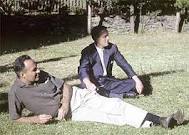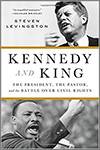Wofford and Shriver cited in new book: KENNEDY AND KING
The story of Harris Wofford and Sarge Shriver’s advice to Jack Kennedy in the 1960 election has been told many times. I first heard it from Wofford in Ethiopia when a group of PCVs were at the Woffords’ home for dinner back in 1962. For those who do not know the history, Wofford was the first Peace Corps Director in Ethiopia, having already helped to create the Peace Corps with Shriver, and after having been Kennedy’s civil rights advisor in the White House, and before that involved in the campaign to elect Kennedy president when this incident took place.
In a new book: KENNEDY AND KING The President, the Pastor, and the Battle Over Civil Rights by Steven Levingston, reviewed in the New York Times in this week’s Sunday edition, that event in the presidential campaign is detailed again. Many believe it was the ‘key’ event that swayed the election in Kennedy’s favor.
“Released on bail a day later, King mentioned Kennedy’s call and Vice President Richard Nixon’s silence. King did not endorse Kennedy, but news of the phone call spread quickly and undoubtedly energized black voters in a close election. Among those whose minds were changed was a black Southerner who (unlike most) could vote. He was Martin Luther King Sr. “I had expected to vote against Senator Kennedy because of his religion,” Daddy King said. “Now he can be my president, Catholic or whatever he is.”
More at The New York Times.


How hard and how far this country has fallen since those days which fostered such hope for a better world!
Harris was a compassionate human being who wanted volunteers to suceed. One of my housemate, a man in his thirties was quickly envelop by culture shock (he blamed his inability to get martinis) and was on the verge of quitting. Harris spent the entire night in Mekelle drinking beer and telling the person that he could transfer to Asmara where he could not only have martinis but also access to the cinema, pastries, pork chops and twenty four hours electricity and not just water but hot water on tap. I saw this volunteer in 2007 and he admitted that he had a serious case of culture shock and that Harris told him that as an experienced teacher the Peace Corps could not afford to lose him.
My Peace Corps culture shock story comes from Dr. Vince D’Andrea M.D. who was the Deputy Director of Psychiatry for the Peace Corps in 1966-67. He was one of the PC/W staff who went out to India as part of the Termination Conference for a group of female volunteers. When he walked into the room where he and a staff member from another country were about to start the 3-day interview process at the end of those PCV’s service, he noticed that the two dozen or so were all seated on the floor with their skirts modestly covering their legs. Coming from Stanford University where undergraduates were dressed in miniskirts with or without bras, he asked : “Do you think your stay in India has affected your life style”, and the women all shook their heads and responded “No.”
Walter P. Blass, Country Dkirector PC/Afghanistan 1966-68